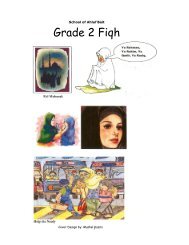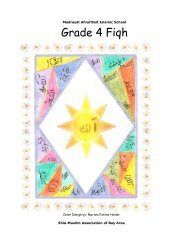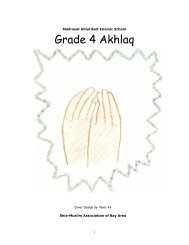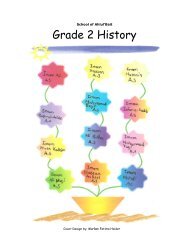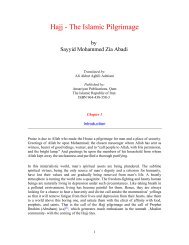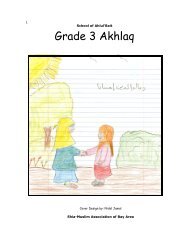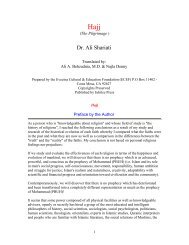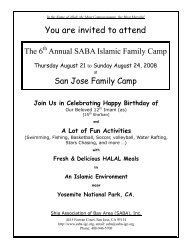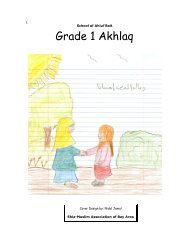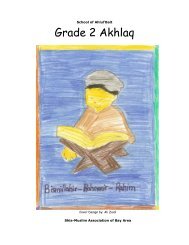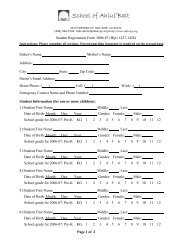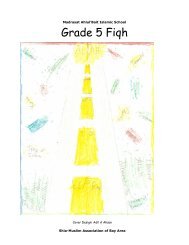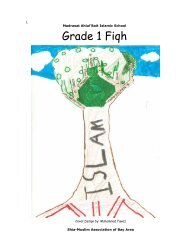Grade 3 Akhlaq Book (PDF) - Shia Multimedia
Grade 3 Akhlaq Book (PDF) - Shia Multimedia
Grade 3 Akhlaq Book (PDF) - Shia Multimedia
You also want an ePaper? Increase the reach of your titles
YUMPU automatically turns print PDFs into web optimized ePapers that Google loves.
1.<br />
Madrasat Ahlul’Bait Islamic School<br />
<strong>Grade</strong> 3 <strong>Akhlaq</strong><br />
Cover Design by: Nidal Jamal<br />
<strong>Shia</strong>-Muslim Association of Bay Area
First Edition (Revision 1.0)<br />
First Printing September 10, 2006<br />
Compilers and Co-Authors:<br />
Samina Ali, Member Syllabus Committee,<br />
Madrasat Ahlul’Bait, <strong>Shia</strong>-Muslim Association of Bay Area<br />
Editors:<br />
Sister Urooj Kazmi, Chair Syllabus Committee,<br />
Madrasat Ahlul’Bait, <strong>Shia</strong>-Muslim Association of Bay Area<br />
Copyright Free & Non-Profit Notice:<br />
Madrasat Ahlul’Bait curriculum material can be freely copied, duplicated, reproduced, quoted,<br />
distributed, printed, used in derivative works and saved on any media and platform for non-profit<br />
and educational purposes only. A fee no higher than the cost of copying may be charged for the<br />
material.<br />
Note from Madrasat Ahlul’Bait:<br />
The Publishers and the Authors have made every effort to present the Quranic verses, prophetic<br />
and masomeen traditions, their explanations and the material from the sources referenced in an<br />
accurate, complete and clear manner. We ask for forgiveness from Allah (SWT) and the readers if<br />
any mistakes have been overlooked during the review process.<br />
Contact Information:<br />
Any correspondence related to this publication and all notations of errors or omissions should be<br />
addressed to Syllabus Committee, Madrasat Ahlul’Bait, <strong>Shia</strong>-Muslim Association of Bay Area at<br />
saba@saba-igc.org.<br />
Published by:<br />
Madrasat Ahlul’Bait<br />
<strong>Shia</strong>-Muslim Association of Bay Area<br />
4415 Fortran Court, San Jose, CA 95134, USA<br />
www.saba-igc.org<br />
saba@saba-igc.org<br />
LIMIT OF LIABILITY/DISCLAIMER OF WARRANTY: THE PUBLISHER AND THE AUTHORS MAKE NO REPRESENTATIONS<br />
OR WARRANTIES WITH RESPECT TO THE ACCURACY OR COMPLETENESS OF THE CONTENTS OF THIS WORK AND<br />
SPECIFICALLY DISCLAIM ALL WARRANTIES, INCLUDING WITHOUT LIMITATION WARRANTIES OF FITNESS FOR A<br />
PARTICULAR PURPOSE. NO WARRANTY MAY BE CREATED OR EXTENDED BY SALES OR PROMOTIONAL MATERIALS.<br />
THE ADVICE AND STRATEGIES CONTAINED HEREIN MAY NOT BE SUITABLE FOR EVERY SITUATION. NEITHER THE<br />
PUBLISHER NOT THE AUTHORS SHALL BE LIABLE FOR DAMAGES ARISING HEREFROM. THE FACT THAT AN<br />
ORGANIZATION, BOOK OR WEBSITE IS REFERRED TO IN THIS WORK AS A CITATION AND/OR A POTENTIAL SOURCE<br />
OF FURTHER INFORMATION DOES NOT MEAN THAT THE AUTHORS OR THE PUBLISHER ENDORSES THE<br />
INFORMATION THE ORGANIZATION OR WEBSITE MAY PROVIDE OR RECOMMENDATIONS IT MAY MAKE. FURTHER,<br />
READERS SHOULD BE AWARE THAT BOOKS AND INTERNET WEBSITES LISTED IN THIS WORK MAY HAVE CHANGED<br />
OR DISAPPEARED BETWEEN WHEN THIS WORK WAS WRITTEN AND WHEN IT IS READ. SHIA ASSOCIATION OF BAY<br />
AREA IS NOT ASSOCIATED WITH ANY ORGANIZATION, PRODUCT OR VENDOR MENTIONED IN THIS BOOK.<br />
2 <strong>Grade</strong> 3 <strong>Akhlaq</strong>
Table of Contents<br />
Table of Contents ...........................................................................................................3<br />
Foreword ........................................................................................................................5<br />
Chapter 1: Necessity of Good <strong>Akhlaq</strong> ........................................................................6<br />
1.1 Worksheet: Necessity of Good <strong>Akhlaq</strong>.......................................................................................8<br />
Chapter 2: Islamic Greetings.......................................................................................9<br />
2.1 Salam un Alaykum:....................................................................................................................9<br />
2.2 Worksheet: Salaam-un-Alaykum:.............................................................................................11<br />
2.3 Fi-Amanillah.............................................................................................................................12<br />
2.4 Worksheet: Fi-Amsnillah..........................................................................................................13<br />
Chapter 3: Thanking Allah........................................................................................14<br />
3.1 Worksheet: Thanking Allah......................................................................................................15<br />
Chapter 4: Thanking Others ......................................................................................16<br />
4.1 Worksheet:Thanking Others .....................................................................................................17<br />
Chapter 5: Manners in the Mosque ...........................................................................18<br />
5.1 Worksheet: Manners in the Mosque..........................................................................................20<br />
Chapter 6: Ettiquette of Ziyarat.................................................................................21<br />
6.1 Worksheet: Etiquette of Ziyarat................................................................................................22<br />
Chapter 7: Classroom Manners.................................................................................23<br />
7.1 Worksheet: Classroom Manners ...............................................................................................24<br />
Chapter 8: Toilet Manners.........................................................................................25<br />
8.1 Worksheet: Toilet Manners: .....................................................................................................27<br />
Chapter 9: To look after others Property ..................................................................28<br />
9.1 Worksheet: To look after others Property.................................................................................30<br />
Chapter 10: Teasing .................................................................................................32<br />
10.1 Worksheet: Teasing ................................................................................................................33<br />
Chapter 11: Honesty ................................................................................................34<br />
11.1 Worksheet: Honesty................................................................................................................36<br />
Chapter 12: To Forgive others.................................................................................37<br />
12.1 Worksheet: To Forgive others: ...............................................................................................38<br />
Chapter 13: Jealousy................................................................................................39<br />
13.1 Worksheet: Jealousy ...............................................................................................................41<br />
Chapter 14: Watching Too Much T.V.....................................................................42<br />
14.1 Worksheet: Watching Too Much T.V. ...................................................................................43<br />
Chapter 15: All creatures of Allah are important ....................................................44<br />
15.1 Worksheet: All creatures of Allah are important....................................................................46<br />
Chapter 16: Social Interaction: Family and Elderly ................................................47<br />
16.1 Family .....................................................................................................................................47<br />
16.2 Elderly.....................................................................................................................................48<br />
16.3 Worksheet: Social Interaction.................................................................................................49<br />
Chapter 17: Cleanliness ...........................................................................................50<br />
<strong>Grade</strong> 3 <strong>Akhlaq</strong> 3
17.1 Worksheet: Cleanliness...........................................................................................................53<br />
Acknowledgements......................................................................................................54<br />
4 <strong>Grade</strong> 3 <strong>Akhlaq</strong>
In the Name of Allah the Most Gracious Most Merciful<br />
Foreword<br />
The material presented in this document is a result of an effort made by the<br />
personnel of the school of Ahlul’Bait of the <strong>Shia</strong>-Muslim Association of Bay Area<br />
Islamic Center at San Jose, California in cooperation with several schools of<br />
Ahlul’Bait at London-Stanmore, London-Hujjat, Vancouver, Minnesota and Toronto.<br />
We, at San Jose, looked at material from London-Stanmore, London-Hujjat,<br />
Vancouver, Minnesota, Toronto and Irvine's Islamic institutions, as well as that<br />
available at various web-sites to compile age appropriate textbooks for use by our<br />
students. We thank the institutions that were kind enough to provide us with the<br />
electronic files of their curriculum. We used some of what they had and added to it<br />
what we felt was appropriate. We included more worksheets and pictures where<br />
deemed necessary. We also added some new topics that, we felt are important to<br />
the students.<br />
We had two important goals in mind while working on this document. First, introduce<br />
the students to the important Islamic concepts and beliefs that are crucial for him/her<br />
to know. Second, expose the students to as many Quranic verses and sayings from<br />
Prophet Muhammad (p) and his Ahlul’Bait (a) as possible.<br />
We thank Hujjatul Islam Maulana Nabi Raza Abidi for his spiritual guidance. We hope<br />
future efforts will continue taking place until reaching our goal of having a strong, rich<br />
and unified curriculum for the schools of Ahlul’Bait for all ages.<br />
Syllabus Committee<br />
Madrasat Ahlul’Bait<br />
<strong>Grade</strong> 3 <strong>Akhlaq</strong> 5
Chapter 1:<br />
Necessity of Good <strong>Akhlaq</strong><br />
The Holy Prophet (S) has said:<br />
"I have been sent by Allah to teach people good manners"<br />
The above hadith shows us how important good <strong>Akhlaq</strong> (manners) is considered in<br />
Islam.<br />
A person once came to the<br />
Holy Prophet (s.a.w.) and<br />
said that there was a<br />
woman who observed fast<br />
during daytime and spent<br />
her nights in prayers, but<br />
she was ill-mannered and<br />
hurt her neighbours with her<br />
tongue.<br />
The Holy Prophet (s.a.w.) said that the old woman was worthless and that<br />
she would be one of the inmates of hell.<br />
The above incident tells us that:<br />
Your Good Deeds do NOT count for much if your <strong>Akhlaq</strong> is bad<br />
Imam Ja'far as-Sadiq (a.s.) has said that someone with good <strong>Akhlaq</strong> gets the<br />
same Thawaab as someone who fasts during daytime and prays at night.<br />
6 <strong>Grade</strong> 3 <strong>Akhlaq</strong>
The Holy Prophet (s.a.w.) and our Holy Imams (a.s.) managed to attract a lot of<br />
people to Islam through their good <strong>Akhlaq</strong>.<br />
Remember that when you are behaving badly out in public, people will not say look<br />
at that boy/girl behaving badly. People will say look at that Muslim behaving badly.<br />
You are therefore not only letting yourself and your parents down but also Islam.<br />
Our 12 th Imam has left all of us as the caretakers of Islam!<br />
<strong>Grade</strong> 3 <strong>Akhlaq</strong> 7
1.1 Worksheet: Necessity of Good <strong>Akhlaq</strong><br />
Write and draw 2 things that you should not do and 2 things that are good to do:<br />
E.g.: Shouldn’t fight:<br />
Should always share:<br />
8 <strong>Grade</strong> 3 <strong>Akhlaq</strong>
Chapter 2:<br />
Islamic Greetings<br />
2.1 Salam un Alaykum:<br />
We are Muslims, which means that everything we do is for<br />
Allah.<br />
Allah tells us that all Muslims are brothers and sisters and<br />
that we should care for each other.<br />
By saying Salaam-un-alaykum you are not just saying hello,<br />
but you are telling the person that you care about them and you<br />
will not hurt them in any way because<br />
Salaam-un-alaykum means "Peace be on you."<br />
So before you talk to a Muslim you should first<br />
say Salaam-un-alaykum. It is also good to<br />
shake hands with them.<br />
When you wake up in the morning the first thing<br />
you should do is say Salaam-un-alaykum<br />
to your mummy and daddy.<br />
If someone says Salaam-un-alaykum to you then you should reply with<br />
Wa-alaykum Salaam.<br />
Wa Alaykum Salaam means “And Peace be on you.”<br />
<strong>Grade</strong> 3 <strong>Akhlaq</strong> 9
Wa Alaykum<br />
Salaam, Mom<br />
Salaamun Alaykum<br />
Javad<br />
Allah does not like for you not to reply to Salaam.<br />
10 <strong>Grade</strong> 3 <strong>Akhlaq</strong>
2.2 Worksheet: Salaam-un-Alaykum:<br />
Say Salaam-un-alaykum and shake the hands of the person sitting on your right<br />
and then shake hands with the person on your left. Then Colour the picture:<br />
<strong>Grade</strong> 3 <strong>Akhlaq</strong> 11
2.3 Fi-Amanillah<br />
We are Muslims, which means that everything<br />
we do is for Allah.<br />
Allah tells us that all Muslims<br />
are brothers and sisters and<br />
that we should care for each other.<br />
By saying Fi-Amanillah,<br />
you are not just saying good-bye,<br />
but you are telling the person that<br />
you care about them because you<br />
are asking Allah to take care of them<br />
Fi-Amanillah means: I leave you in the care of Allah<br />
Whenever you leave your mom and dad you should say Fi Amanallah to them so<br />
that Allah may keep them safe.<br />
Fi-Amanillah Javad<br />
Fi-Amanillah<br />
Mom<br />
Before you go to sleep you should say Fi-Amanillah.<br />
12 <strong>Grade</strong> 3 <strong>Akhlaq</strong>
2.4 Worksheet: Fi-Amsnillah<br />
Color in the picture of the friends saying Fi-Amanillah to each other.<br />
<strong>Grade</strong> 3 <strong>Akhlaq</strong> 13
Chapter 3:<br />
Thanking Allah<br />
Alhamdulillah = a way of thanking Allah.<br />
Alhamdulillah means all thanks is to Allah, because Allah made everything and He<br />
is the most powerful.<br />
Why do we thank Allah?<br />
We thank Him because of all the lovely things He has given us:<br />
Eyes to<br />
see with<br />
Hands to hold<br />
things hingsth<br />
A brain to understand<br />
things<br />
A family to<br />
care for us<br />
Some people are blind or deaf or don’t have legs. Allah created people with<br />
disabilities to help those of us who have everything is thankful for what we have.<br />
So let us remember to do only good things which Allah<br />
likes, and say Alhamdulillah for all the things he has<br />
given us.<br />
14 <strong>Grade</strong> 3 <strong>Akhlaq</strong>
3.1 Worksheet: Thanking Allah<br />
Draw something else for which you can say Alhamdulillah:<br />
E.g.: To be thankful for a bed to sleep in<br />
<strong>Grade</strong> 3 <strong>Akhlaq</strong> 15
Chapter 4:<br />
Thanking Others<br />
We are Muslims, which means that every thing we do is for Allah.<br />
Allah tells us that all Muslims are brothers and that we should care<br />
for each other.<br />
Jazakallah = May Allah reward you.<br />
This tells a person that you care about them<br />
because you are asking Allah to reward<br />
them for what they have done for you.<br />
By saying Jazakallah to someone, you are asking Allah to give them more thawaab<br />
so that they may go to heaven. In return, Allah also gives you more thawaab.<br />
You should say Jazakallah when someone is kind to you helps you<br />
in any way or gives you something.<br />
16 <strong>Grade</strong> 3 <strong>Akhlaq</strong>
4.1 Worksheet:Thanking Others<br />
When someone helps you or gives you something you say Jazakallah.<br />
Draw 2 pictures of when someone would say Jazakallah:<br />
E.g.: Helping Mom to sweep up the leaves:<br />
Jazakallah<br />
<strong>Grade</strong> 3 <strong>Akhlaq</strong> 17
Chapter 5:<br />
Manners in the Mosque<br />
Mosque is a place only for Salaat.<br />
Islamic Center is a place for Salaat and other functions.<br />
You should enter with your right foot, and remember where you are entering and<br />
act with due respect.<br />
Say ASSALAM O ALAIKUM to people as you see them, do not wait for them to say<br />
it first. After removing your shoes, find a place to sit.<br />
Do not<br />
sit<br />
against<br />
the wall<br />
Sit up<br />
straight<br />
While lecture is going on, listen carefully.<br />
Do not talk during lecture, Adhan,<br />
Iqamah, Salaat or du’a.<br />
Sit in such a manner<br />
that everyone<br />
around you is sitting<br />
comfortably<br />
18 <strong>Grade</strong> 3 <strong>Akhlaq</strong>
If you do not understand the lecture, recite Salawaat or Tasbeeh of Bibi Fatimah<br />
Zahra (a.s.).<br />
When food (Tabarruk) is given out, wait to be given one and then take only one.<br />
When leaving, leave slowly being careful not to push anyone. Leaving with your left<br />
foot first.<br />
Say Fiamanillah to people as you leave.<br />
<strong>Grade</strong> 3 <strong>Akhlaq</strong> 19
5.1 Worksheet: Manners in the Mosque<br />
Draw below things that you should NOT do in the Islamic center.<br />
E.g.: Running around:<br />
20 <strong>Grade</strong> 3 <strong>Akhlaq</strong>
Chapter 6:<br />
Ettiquette of Ziyarat<br />
Visiting the Holy shrines of 14 Masumeen is called<br />
Ziyarat<br />
Merits and blessing s of the ziyarats of the Masumeen<br />
are many; few of them are as follows<br />
1. Acceptance of duaas to Allah.<br />
2. Long, healthy and meaningful life.<br />
3. Respect in this world and Hereafter.<br />
4. Protection from hardship and sorrow.<br />
Idhn-e- Dukhool is the permission that a pilgrim<br />
seeks before entering the holy mosque and shrines. It<br />
is highly recommended to pray salat, recite Holy Quran and say duaas<br />
written by Imam Ali (as) and Imam Zainul Abideen (as) as much as<br />
possible during the stay inside the Holy Haram (the boundaries of the<br />
Holy Shrine).<br />
Ziyarat Widaa or the Farewell Ziyarat is recited while leaving the<br />
Shrine.<br />
There is no better place or occasion than<br />
being near the resting place of the 14<br />
Masumeen, to ask Allah for the fulfillment<br />
of our duaas.<br />
<strong>Grade</strong> 3 <strong>Akhlaq</strong> 21
6.1 Worksheet: Etiquette of Ziyarat<br />
Ahmad is going to Karbala ,Khadmain ,Najaf and Saamra for Ziyarat.<br />
Using your knowledge about the Islamic Holy cities in Iraq that you have<br />
learned in history, briefly describe the shrines he will be visiting and what<br />
etiquettes he should observe over there?<br />
__________________________________________________________-<br />
___________________________________________________________.<br />
22 <strong>Grade</strong> 3 <strong>Akhlaq</strong>
Chapter 7:<br />
Classroom Manners<br />
It is every Muslim's duty to gain knowledge,<br />
and learn as much as you can.<br />
Knowledge is what you learn and what you know.<br />
You can learn new things at home, at mosque, in Madressa, at school, and many<br />
other places. We will concentrate on learning in Madressa.<br />
There are some important things you must do when you are learning something:<br />
Remember<br />
Allah before<br />
you start<br />
Sit up straight in<br />
your chair<br />
Do not<br />
talk in<br />
class!<br />
Listen carefully to<br />
the lesson<br />
Bismillah<br />
Remember to thank the person who is teaching you.<br />
Use that knowledge to make yourself a<br />
better person and also teach others (your<br />
younger brothers or sisters, and your<br />
friends) what you have learnt.<br />
<strong>Grade</strong> 3 <strong>Akhlaq</strong> 23
7.1 Worksheet: Classroom Manners<br />
Remember always to concentrate on your lesson completely:<br />
Learn the little poem!<br />
Work while you work,<br />
Play while you play,<br />
One thing each time,<br />
That is the way,<br />
All that you do,<br />
Do with your might,<br />
Things done by halves,<br />
Are not done right.<br />
Draw a picture of something you should NOT do in your lesson:<br />
24 <strong>Grade</strong> 3 <strong>Akhlaq</strong>
Chapter 8:<br />
Toilet Manners<br />
You should go to the toilet as soon as you need to, and not wait to<br />
finish what you are doing.<br />
Wear some slippers, because the<br />
floor may be wet (najis)<br />
Fill a jug with water<br />
At school, take some water in a cup. If there is no cup, clean yourself with a wet<br />
tissue.<br />
When you get home, tell your mom that you used tissue and not water; your<br />
When you go to the toilet,<br />
SIT on the seat. DO NOT<br />
STAND .<br />
underwear will be Najis and has to be washed.<br />
If you cannot wash yourself, call someone to wash you.<br />
Then, wash yourself 2 times<br />
<strong>Grade</strong> 3 <strong>Akhlaq</strong> 25
Wipe yourself dry<br />
Get off the toilet and put<br />
your clothes on again<br />
Wash your hands and<br />
wipe them dry<br />
Remember that when you are sitting on the toilet you should<br />
not face or have your back to Qibla.<br />
If the toilet is facing Qibla then sit a little sideways.<br />
26 <strong>Grade</strong> 3 <strong>Akhlaq</strong>
8.1 Worksheet: Toilet Manners:<br />
Number the following in the right order, and then colour them in:<br />
<strong>Grade</strong> 3 <strong>Akhlaq</strong> 27
Chapter 9:<br />
To look after others Property<br />
Allah says in the Holy Qur'an: "Surely only those believers, who guard the<br />
properties of others entrusted to them and keep their promises have<br />
achieved success."<br />
The above verse tells us that successful believers are the ones that:<br />
- take proper care of other people’s things that have been given to them to<br />
look after AND<br />
- Keep their promises.<br />
Things that have been left in your trust can be left on purpose or by mistake.<br />
E.g.: some one can give you something to look after, OR to pass it on to someone<br />
else, OR, they may have forgotten something at your house.<br />
In all these cases you have to take proper care of the thing until you have given it<br />
to which it belongs.<br />
It can be really expensive or of no value at all. You still have to take great care of it.<br />
If something has been given to you to look after, you are not allowed to use it or<br />
open it to look at, without the person's permission.<br />
In the time of Imam Ali (a.s.) 2 people named Talha and Zubair came to see him.<br />
Imam Ali (a.s.) was sitting by a lighted candle doing some official work. As Talha<br />
and Zubair sat down to talk to him, he put out the lighted candle and lit another<br />
one.<br />
28 <strong>Grade</strong> 3 <strong>Akhlaq</strong>
Moral:<br />
Imam was trying to show the importance of other people's<br />
properties, so much so, that as little as the light of a candle<br />
cannot be used without permission.<br />
<strong>Grade</strong> 3 <strong>Akhlaq</strong> 29
9.1 Worksheet: To look after others Property<br />
Teacher Assisted Discussion:<br />
Write what these children should do now:<br />
a. Zahra gave Sakina a pencil to use, but she lost it.<br />
b. Husain gave Abbas a remote control car to pass on to his brother Hasan but<br />
Abbas like the car very much and gave Hasan one of his other cars instead.<br />
c. When Fatimah came to Madressa she wrote on the blackboard without<br />
asking her teacher if she could use the chalk.<br />
d. Sabira borrowed Tahira’s sharpner in class and forgot to give it back to her.<br />
e. Haider forgot his Gameboy at your house with the latest game in it and you<br />
played with it.<br />
30 <strong>Grade</strong> 3 <strong>Akhlaq</strong>
f. Zahid’s teacher forgot her Madressa bag in his father’s car and he just<br />
opened it to quickly see how he had done in his test.<br />
g. Ali’s mother gave him a big box of chocolates to give to his grandmother and<br />
he ate only one small one.<br />
h. Sayyada’s father bought 2 boxes of candy, one for her and one for her<br />
sister. After she had eaten hers, she ate her sister’s as well because she<br />
was very hungry and her sister was not at home anyway.<br />
i. Kadhim drew a picture of a beautiful house in his big brother’s homework<br />
book.<br />
<strong>Grade</strong> 3 <strong>Akhlaq</strong> 31
Chapter 10: Teasing<br />
Feelings are your emotions, how happy or sad you are.<br />
If you hurt someone<br />
physically, on their body,<br />
they can get medicine for it<br />
and it soon gets better.<br />
However, if you hurt someone’s feelings, there is no medicine for that. The pain<br />
feels more and lasts much longer. It may even change the way the person feels<br />
about him/herself. They may even lose confidence in themselves.<br />
When you tease someone or make fun of someone:<br />
- Think how you would feel if you were them.<br />
- Think how much you are hurting them.<br />
- Think that this person may lose confidence in them, (which may affect their<br />
whole life).<br />
So next time, when you are just making fun of someone with your friends - THINK.<br />
Remember that you have to account for everything on the Day of Judgement.<br />
Allah says that He might forgive you for the sins you<br />
have committed against Him, E.g. not praying or fasting..)<br />
BUT He will not forgive you for hurting other people’s feelings<br />
– unless they forgive you first.<br />
So, act now and ask for forgiveness from anyone whose feelings you may have<br />
hurt and make sure you do not hurt others feelings in the future.<br />
32 <strong>Grade</strong> 3 <strong>Akhlaq</strong>
10.1 Worksheet: Teasing<br />
Draw a picture of you in the centre and write in the bubbles the 3 "thinks" you<br />
should think of.<br />
<strong>Grade</strong> 3 <strong>Akhlaq</strong> 33
Chapter 11: Honesty<br />
Honesty means truthfulness - in your words and actions.<br />
Lying is the opposite of honesty.<br />
Allah says we should never lie. It is Haraam. Whether it is a big or a small lie,<br />
whether it is done in seriousness or jokingly. It is Haraam!<br />
A perfect example of honesty is our Holy Prophet Muhammad (s.a.w.), who was<br />
known as the truthful one even by his enemies.<br />
Once a man came to the Holy Prophet (s.a.w.) and told<br />
him that he was committing many sins like drinking,<br />
gambling, stealing...And now he had decided to became a<br />
Muslim but he could only give up one of the sins at a time.<br />
The Holy Prophet told him to give up lying.<br />
The man agreed, thinking he had got of lightly.<br />
Now the next day, when the man went to steal something, he stopped and thought.<br />
If he got caught, he would not be able to say he did not do it because he could not<br />
lie.<br />
And even if he did not get caught, how would he be able to face the Holy Prophet<br />
(s.a.w.) and tell him all the wrong he had done. It would be so embarrassing.<br />
So by giving up lying the man also gave up his other sins.<br />
One lie usually leads to another, as you try to cover the lie you told before.<br />
So, it is better to tell the truth at the beginning. Otherwise you will soon get into the<br />
habit of lying without even thinking about it.<br />
34 <strong>Grade</strong> 3 <strong>Akhlaq</strong>
Allah knows everything, so although you may think you have got away with telling<br />
a lie and no-one knows, remember Allah knows and He is who you have to answer<br />
to.<br />
So, it is better to tell the truth and be punished if you have done something wrong;<br />
than to lie and be punished by Allah in the hereafter.<br />
<strong>Grade</strong> 3 <strong>Akhlaq</strong> 35
11.1 Worksheet: Honesty<br />
One of the titles of our Holy Prophet Muhammad (s.a.w.) was the truthful one, as you<br />
were told in the notes.<br />
If you take the first letter of each of the pictures below, you will know how to say this<br />
title in Arabic.<br />
THE TRUTHFUL ONE - ___ ___ - ___ ___ ___ ___ ___<br />
36 <strong>Grade</strong> 3 <strong>Akhlaq</strong>
Chapter 12: To Forgive others<br />
Allah says in the Holy Qur'an,<br />
"….If you forgive, overlook and cover up (their faults),<br />
then indeed Allah is oft-forgiving, merciful."<br />
The above Ayat tells us that if we forgive, and not just forgive but also hide others<br />
people’s faults then Allah will do the same for us and remember Allah is the Most<br />
Forgiving.<br />
To forgive someone is to let someone of the hook,<br />
to pardon someone for their mistake towards you.<br />
Allah not only tells us to forgive but also overlook - let things pass: And to cover up<br />
- not to tell others what that person had done.<br />
Our 1 st Imam, Imam Ali (a.s.) has said that at times when you can have revenge on<br />
someone, when you have the power to pay back and then you forgive that is called<br />
true forgiving.<br />
The above Hadith tells us that it is truly forgiving when you have the means to get<br />
revenge for what that person had done and you do not use these means but<br />
instead forgive.<br />
To forgive someone means then you forget about it, and not to remind the person<br />
of it, nor to tell anyone else of it.<br />
Imam Ali (a.s.) has said "Punish your enemies with kindness and do them a<br />
good deed in return for the harm that they have done to you.<br />
<strong>Grade</strong> 3 <strong>Akhlaq</strong> 37
12.1 Worksheet: To Forgive others:<br />
Why should you forgive people?<br />
What does it truly mean to forgive someone?<br />
Draw something that somebody could do to upset you but you would still forgive<br />
them.<br />
E,g,: Your little sister throws all your favorite books off the shelf and<br />
your Mom tells you off:<br />
38 <strong>Grade</strong> 3 <strong>Akhlaq</strong>
Chapter 13: Jealousy<br />
Jealousy means to want the<br />
same as somebody else has.<br />
This is a bad habit because it means that you are not satisfied with what Allah has<br />
given you.<br />
In the Holy Qur'an Allah says:<br />
"And do not covet those things which Allah has given as gifts more<br />
freely on some of you than on others; for men shall have of what<br />
they earn, and women will have of what they earn: But ask Allah for<br />
his bounty. For Allah has full knowledge over all things."<br />
, jealousy (in its worst form) means not to want<br />
something that someone else has, but at the same time<br />
not wanting him to have it either.<br />
There once was a man who had a farm. His neighbor<br />
also had a farm. One day the man saw his neighbor<br />
milking a beautiful cow. The cow was giving plenty of<br />
milk, and the milk was sweet and tasted excellent. The<br />
man did not like it and felt very angry that his neighbor<br />
should have such a good cow.<br />
Then Shaytan came to the man and asked him what the problem was. The man<br />
pointed to the cow and said "Look what a wonderful cow my neighbour has." Shaytan<br />
replied, "Is that all, I will give you ten cows like that."<br />
The man answered "I don't want even one cow like that; I just don't want my neighbor<br />
to have it!"<br />
This shows how dangerous jealousy can be. It makes people lose their mind.<br />
<strong>Grade</strong> 3 <strong>Akhlaq</strong> 39
Imam Ali (a) has said:<br />
"Jealousy eats up good deeds like a fire consumes<br />
wood."<br />
We know the way in which dry wood is burnt and consumed<br />
by a hot raging fire. That is what jealousy does to our deeds.<br />
"A jealous person can never be a leader of men."<br />
This means that if you have a leader who is jealous, he will always be worried about<br />
himself, and will never want anyone else to have anything good. This means that his<br />
followers will be badly treated and oppressed, so they will leave him.<br />
40 <strong>Grade</strong> 3 <strong>Akhlaq</strong>
13.1 Worksheet: Jealousy<br />
Fill in the blanks<br />
1. _____________ means to want the same as somebody else has.<br />
2. A jealous person is always worried about _____________.<br />
3. A jealous person can never be the _______________ of men.<br />
4. _______________ has said, “Jealousy eats up good deeds like a fire<br />
consumes wood.”<br />
5. A jealous person is never satisfied with what ______________ has<br />
given<br />
him.<br />
Allah<br />
Jealousy<br />
Imam Ali (as)<br />
Himself<br />
Leader<br />
<strong>Grade</strong> 3 <strong>Akhlaq</strong> 41
Chapter 14: Watching Too Much T.V.<br />
Television is one of the widespread inventions of the 20 th century, and like every<br />
invention it has both advantages and disadvantages. The biggest advantage is the<br />
knowledge a person gets by watching informative shows on TV. Shows on<br />
Science, History, Astronomy and nature help us understand the beauty of Allah’s<br />
creations. There are even some good programmes on Islamic studies and Quran<br />
that we can benefit from.<br />
On the other hand watching too much action cartoons makes some children<br />
believe in them, for example they might think that Spider-man is stronger than<br />
Allah.<br />
Television makes us lazy and angry as well. It becomes a bad habit which is very<br />
difficult to get rid of. Television is a conversation stopper as it stops us from sitting<br />
and talking together as a family.<br />
We can discipline ourselves when watching TV by<br />
• Limiting our TV watching to a limited amount of time as allowed by our<br />
parents.<br />
• There shouldn’t be any haram things in the program that we are not allowed<br />
to watch<br />
• Don’t watch shows with bad language.<br />
42 <strong>Grade</strong> 3 <strong>Akhlaq</strong>
14.1 Worksheet: Watching Too Much T.V.<br />
Circle the right answer.<br />
1. The biggest advantage a person gets by watching TV is<br />
_______________<br />
a. fun<br />
b. Knowledge<br />
c. Happiness<br />
2. Telivision makes us ____________________.<br />
a. lazy<br />
b. fast<br />
c. sleepy<br />
3. There shouldn’t be any______ things in the program that we are<br />
not allowed to watch.<br />
a. interesting<br />
b. haram<br />
c. halal<br />
4. Television is a _______________stopper.<br />
a. sports<br />
b. conversation<br />
c. home work<br />
5. List some of the advantages and disadvantages of watching too<br />
much T.V.<br />
____________________________________________________________<br />
____________________________________________________________<br />
____________________________________________________________<br />
____________________________________________________________<br />
_________________________.<br />
<strong>Grade</strong> 3 <strong>Akhlaq</strong> 43
Chapter 15: All creatures of Allah are important<br />
All creatures of Allah are important. He listens to the prayers of all His<br />
creatures, no matter how big or small, or rich or poor they are. Allah loves<br />
them all.<br />
A long time ago, in the time of Prophet Sulaiman , there had been no rain for a<br />
long time. All the plants were dying and<br />
the people had very little<br />
food.<br />
The people asked Prophet Sulaiman to pray to Allah for them.<br />
Prophet Sulaiman came out with his people to pray for rain.<br />
Suddenly he noticed an ant standing on its two legs, raising it’s hands<br />
up to the sky and saying:<br />
"Oh Allah! We are very<br />
We cannot survive<br />
Your help. Please send<br />
that we have food to eat."<br />
small.<br />
without<br />
rain so<br />
44 <strong>Grade</strong> 3 <strong>Akhlaq</strong>
Prophet Sulaiman , who understood the language of the animals, told his people<br />
that they could all go home as the prayer of that one little ant was enough.<br />
It then rained heavily and all the land became green.<br />
Moral:<br />
No matter who or what you are. Allah loves you and always<br />
listens to your prayers (Du'a) if they are from your heart.<br />
<strong>Grade</strong> 3 <strong>Akhlaq</strong> 45
15.1 Worksheet: All creatures of Allah are important<br />
Color the creatures whose prayers Allah will answer.<br />
46 <strong>Grade</strong> 3 <strong>Akhlaq</strong>
Chapter 16: Social Interaction: Family and Elderly<br />
Throughout life, you are constantly moving on a journey from cradle to<br />
grave. During this journey, you meet a sea of people, some whom you will<br />
forget before they leave your eyesight, while others who you will<br />
remember even after they have crossed the farthest seas<br />
Each person you meet adds to what you are in one way or another. How<br />
you deal with people in general will be personal and different on an<br />
individual basis, and this will be reflected in how you yourself are treated<br />
by others.<br />
One group of people who are always taken for granted are the family,<br />
however, when you fall and everyone deserts you, your family will be<br />
there to pick you up.<br />
16.1 Family<br />
A family is a group of people with a<br />
special connection binding them.<br />
This connection can be by blood, or<br />
in some other ways. No matter how<br />
badly our family treats us, or how<br />
difficult they are to please, we should<br />
always keep the family united, and maintain contact with our relatives.<br />
Remember our 4 th Imam's (A) prayer, in Sahifa e Kamila,<br />
"Oh Allah, give me the grace to act with sincerity to those who were<br />
insincere to me."<br />
It is your duty to keep with your family, even if they are not sincere with<br />
you. Do not let pride, or politics enter your thinking. Act in the way Allah<br />
would like best, and all will be well.<br />
<strong>Grade</strong> 3 <strong>Akhlaq</strong> 47
16.2 Elderly<br />
Respect to elders is a very important concept. Elders are<br />
not just old people, but people who have done their share<br />
for the community. They have worked hard and it is<br />
thanks to them that we have all the things around us<br />
today! Is it fair that when they are too old to work, that<br />
we should forget them and send them away to old<br />
people's homes. We are young now, but how would you<br />
feel if after you have lived and given your life in<br />
service to the community. And then your own<br />
youngsters were to ignore you and forget you.<br />
We must not only respect our elders, but thank<br />
them and listen to their advice. No matter how<br />
much we know, our elders have had experience,<br />
and Imam Ali (A) has said,<br />
"What is better than knowledge is<br />
experience."<br />
Allah tells us that the best ornaments of a community are its elderly<br />
people. They are the cause of so many blessings that if the younger people<br />
knew how much Allah loves the elderly, they would never leave them<br />
alone for even a moment.<br />
48 <strong>Grade</strong> 3 <strong>Akhlaq</strong>
16.3 Worksheet: Social Interaction<br />
Write what these children must do now:<br />
1. Zahra’s cousin Mariam is being rude to her.<br />
_______________________________________________________<br />
_______________________________________________________<br />
_______<br />
2. Bilal is teasing and making fun of Abbas for not being able to catch a<br />
ball.<br />
__________________________________________________________<br />
__________________________________________________________<br />
__________________________________________________________<br />
__________________<br />
3. Amina and Ali’s Grandfather is very old, they can choose to send<br />
him to an old house or keep him at home with them.<br />
__________________________________________________________<br />
__________________________________________________________<br />
__________________________________________________________<br />
__________________<br />
4. Farwa is watching her favorite TV show; her grandma is calling her<br />
for help .<br />
__________________________________________________________<br />
__________________________________________________________<br />
__________________________________________________________<br />
__________________<br />
5. Sami’s Uncle is visiting from Chicago and wants to be friends with<br />
Sami , but Sami is being rude and is upset about something. What<br />
should he do?<br />
__________________________________________________________<br />
__________________________________________________________<br />
_________________________________________<br />
<strong>Grade</strong> 3 <strong>Akhlaq</strong> 49
Chapter 17: Cleanliness<br />
Allah says in the Holy Qur'an: that<br />
He loves those who keep themselves clean.<br />
There is a difference between Clean and Tahir:<br />
Clean = free from dirt. Physically clean.<br />
Tahir = to be pure according to Islam. Spiritually clean.<br />
You should always be clean and try to be Tahir all of the time.<br />
Why is it so important to be clean?<br />
If you do not keep yourself clean then you will get ill, as germs that cause sickness<br />
live in places of dirt.<br />
How do you keep yourself clean?<br />
You should take a bath<br />
regularly.<br />
You should brush your teeth<br />
morning and night.<br />
50 <strong>Grade</strong> 3 <strong>Akhlaq</strong>
Your hair must always be<br />
combed.<br />
You should cut your nails regularly<br />
and make sure they are clean.<br />
You should make sure your<br />
clothes are clean and look neat<br />
and tidy.<br />
Besides keeping yourselves clean you should make sure that the food that you eat<br />
is clean (and always Halaal).<br />
Fruits should be<br />
washed before eating.<br />
<strong>Grade</strong> 3 <strong>Akhlaq</strong> 51
You should also make sure that the things around you are clean - your house, your<br />
room, your cupboards…<br />
52 <strong>Grade</strong> 3 <strong>Akhlaq</strong>
17.1 Worksheet: Cleanliness<br />
We should make sure what we eat is Halaal and that our homes are clean and our<br />
rooms are tidy.<br />
In the other circles draw what you should do to keep yourself clean.<br />
E.g.: Change our clothes when they are dirty.<br />
<strong>Grade</strong> 3 <strong>Akhlaq</strong> 53
Acknowledgements<br />
<strong>Shia</strong>-Muslim Association of Bay Area would like to thank the authors, editors and<br />
reviewers for their contributions to the Madrasat Ahlul-Bait curriculum development<br />
project.<br />
We are especially thankful to Dr. Nabi Raza Abidi for leading the curriculum<br />
committee and providing the motivation and invaluable guidance for the project.<br />
We would like to express our special gratitude to the MAB teachers and staff for their<br />
support and assistance in the development and testing of the curriculum.<br />
SABA is also very thankful to the Islamic organizations and authors whose syllabus<br />
and books were used for the inspiration and creation of this curriculum.<br />
Please remember in your prayers, all the people involved in this project.<br />
54 <strong>Grade</strong> 3 <strong>Akhlaq</strong>



